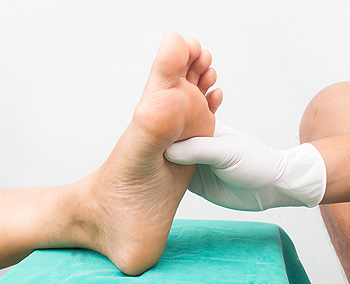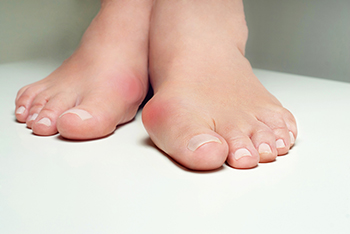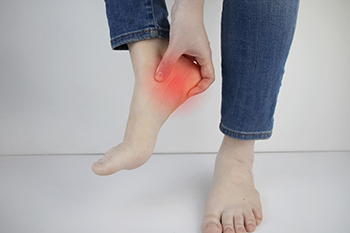Items filtered by date: September 2023
Preventing Problems and Promoting Wellness in Diabetic Patients

For individuals living with diabetes, foot care is not just a luxury but a critical component of their overall health. Diabetes can lead to a variety of foot problems that, if left unattended, may result in severe complications. One common issue is neuropathy, which causes a loss of sensation in the feet. This makes it important to inspect the feet daily for cuts, blisters, or sores that may otherwise go unnoticed. Poor circulation is another concern, as it impairs the body's ability to heal foot wounds. Therefore, it is essential to keep the feet warm and well-protected. Wearing shoes that fit properly and have ample cushioning and arch support are vital to preventing pressure points and ulcers. It is beneficial to schedule regular visits to a podiatrist as part of a diabetic person's healthcare routine to monitor and address any emerging problems. If you have diabetes, it is strongly suggested that you contact this foot doctor who can help you to manage this condition.
Diabetic foot care is important in preventing foot ailments such as ulcers. If you are suffering from diabetes or have any other concerns about your feet, contact Amir Shalev, DPM from Complete Foot & Ankle Care. Our doctor can provide the care you need to keep you pain-free and on your feet.
Diabetic Foot Care
Diabetes affects millions of people every year. The condition can damage blood vessels in many parts of the body, especially the feet. Because of this, taking care of your feet is essential if you have diabetes, and having a podiatrist help monitor your foot health is highly recommended.
The Importance of Caring for Your Feet
- Routinely inspect your feet for bruises or sores.
- Wear socks that fit your feet comfortably.
- Wear comfortable shoes that provide adequate support.
Patients with diabetes should have their doctor monitor their blood levels, as blood sugar levels play such a huge role in diabetic care. Monitoring these levels on a regular basis is highly advised.
It is always best to inform your healthcare professional of any concerns you may have regarding your feet, especially for diabetic patients. Early treatment and routine foot examinations are keys to maintaining proper health, especially because severe complications can arise if proper treatment is not applied.
If you have any questions please feel free to contact our office located in Las Vegas, NV . We offer the newest diagnostic and treatment technologies for all your foot and ankle needs.
Wounds That Don't Heal Need to Be Checked
How to Choose the Right Running Shoe

Choosing the perfect pair of running shoes is essential for runners of all levels. Your choice significantly affects comfort, performance, and overall foot health. To make the right selection, start by identifying your foot type, such as neutral, pronated, or supinated. Next, consider cushioning, which should be minimal for a natural feel, maximum for long-distance shock absorption, or moderate for most runners. Shoe stability matters for injury prevention. Those with flat feet or overpronation should opt for stability features like medial posts, while high arches benefit from neutral shoes with cushioning. A proper fit is also important. Leave about a thumb's width of space between your longest toe and the shoe's front. Try on multiple pairs and take them for a test run in-store to assess comfort and stability. Also, consider the type of surface you will be running on, because road, trail, and track running require different shoe types. Running shoes can become a major investment because they should be replaced after 300-500 miles to ensure optimal performance and prevent injuries. For more help with finding the proper running shoe for your feet, it is suggested that you speak to a podiatrist.
You should always make sure your running shoes fit properly in order to avoid injury. For more information, contact Amir Shalev, DPM from Complete Foot & Ankle Care. Our doctor can provide the care you need to keep you pain-free and on your feet.
Choosing the Right Running Shoe for Your Foot Type
Improper shoe sizing can cause a myriad of problems for your feet. Shoes that don’t fit you properly can lead to muscular imbalances in your body, which can result in foot, knee, and hip injuries.
Tips for Finding the Right Running Shoe
- Make sure you have a thumb’s width of wiggle room between the end of your longest toe and the front of the shoe.
- There should be little to no slipping at the heel
- Don’t assume your size in one shoe brand will be your size in another
- Do not lace up your shoes too tightly
- Walk around in the store with your new shoes before you buy them
If you have any questions please feel free to contact our our office located in Las Vegas, NV . We offer the newest diagnostic and treatment technologies for all your foot and ankle needs.
Definition and Causes of Bunions

Bunions, a painful bump at the base of the big toe, are a common and often misunderstood foot condition. They develop when the joint at the base of the big toe becomes misaligned, causing the tip of the big toe to angle toward the other toes. This misalignment results in a bony protrusion, also known as a bunion. While bunions can be the result of a genetic predisposition, they can also be triggered or exacerbated by various factors. Wearing ill-fitting shoes, especially those with narrow toe boxes or high heels, can force the toes into unnatural positions and contribute to bunion development. Additionally, repetitive stress or trauma to the foot can significantly contribute to getting a bunion. Understanding the causes is essential in preventing and managing bunions, as early intervention and lifestyle changes can help alleviate symptoms and slow their progression. If you have developed a bunion, it is strongly suggested that you speak with a podiatrist who can guide you toward relief and treatment options that are right for you.
If you are suffering from bunions, contact Amir Shalev, DPM of Complete Foot & Ankle Care. Our doctor can provide the care you need to keep you pain-free and on your feet.
What Is a Bunion?
A bunion is formed of swollen tissue or an enlargement of boney growth, usually located at the base joint of the toe that connects to the foot. The swelling occurs due to the bones in the big toe shifting inward, which impacts the other toes of the foot. This causes the area around the base of the big toe to become inflamed and painful.
Why Do Bunions Form?
Genetics – Susceptibility to bunions are often hereditary
Stress on the feet – Poorly fitted and uncomfortable footwear that places stress on feet, such as heels, can worsen existing bunions
How Are Bunions Diagnosed?
Doctors often perform two tests – blood tests and x-rays – when trying to diagnose bunions, especially in the early stages of development. Blood tests help determine if the foot pain is being caused by something else, such as arthritis, while x-rays provide a clear picture of your bone structure to your doctor.
How Are Bunions Treated?
- Refrain from wearing heels or similar shoes that cause discomfort
- Select wider shoes that can provide more comfort and reduce pain
- Anti-inflammatory and pain management drugs
- Orthotics or foot inserts
- Surgery
If you have any questions, please feel free to contact our office located in Las Vegas, NV . We offer the newest diagnostic and treatment technologies for all your foot care needs.
What are the Causes and Treatments for Plantar Fasciitis?

Plantar fasciitis, a prevalent foot condition, can cast a shadow on even the most active lifestyles. It occurs when the plantar fascia, which is defined as the ligament connecting the heel bone to the toes, becomes inflamed or strained. There are various reasons for plantar fasciitis, often stemming from repetitive stress, poor footwear choices, obesity, or abnormal foot structures, such as flat feet. Symptoms encompass sharp heel pain, especially during the first steps in the morning or after periods of inactivity. As painful as this condition can be, there are various options that can be implemented. Treatment methods can range from rest, and taking over-the-counter pain medications to targeted exercises that stretch and strengthen the plantar fascia. In more severe cases, podiatrists may recommend custom orthotics or corticosteroid injections. With proper care and attention, managing plantar fasciitis can help individuals step back into a life unhindered by foot discomfort. If you have developed plantar fasciitis, it is strongly suggested that you are under the care of a podiatrist who can determine what the best course of treatment is for you.
Plantar fasciitis can be very painful and inconvenient. If you are experiencing heel pain or symptoms of plantar fasciitis, contact Amir Shalev, DPM from Complete Foot & Ankle Care. Our doctor can provide the care you need to keep you pain-free and on your feet.
What Is Plantar Fasciitis?
Plantar fasciitis is the inflammation of the thick band of tissue that runs along the bottom of your foot, known as the plantar fascia, and causes mild to severe heel pain.
What Causes Plantar Fasciitis?
- Excessive running
- Non-supportive shoes
- Overpronation
- Repeated stretching and tearing of the plantar fascia
How Can It Be Treated?
- Conservative measures – anti-inflammatories, ice packs, stretching exercises, physical therapy, orthotic devices
- Shockwave therapy – sound waves are sent to the affected area to facilitate healing and are usually used for chronic cases of plantar fasciitis
- Surgery – usually only used as a last resort when all else fails. The plantar fascia can be surgically detached from the heel
While very treatable, plantar fasciitis is definitely not something that should be ignored. Especially in severe cases, speaking to your doctor right away is highly recommended to avoid complications and severe heel pain. Your podiatrist can work with you to provide the appropriate treatment options tailored to your condition.
If you have any questions please feel free to contact our office located in Las Vegas, NV . We offer the newest diagnostic and treatment technologies for all your foot and ankle needs.

